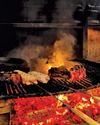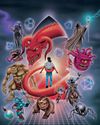
IN THE LATE 1930s, new yorkers barely into middle age could remember a very different Fifth Avenue. The boulevard, a mere decade or so earlier, had been a residential neighborhood of immense Gilded Age houses. It had since been fully given over to commerce, represented by department stores like Saks Fifth Avenue and Bergdorf Goodman as well as the immense Rockefeller Center complex. In March 1939, the city tried to restore a wisp of grace to the limestone canyon. “That business section of Fifth Avenue, which has not known the sight of trees since the days of the stately mansions and the horse and buggy,” one press outlet wrote, “took its first step in arboreal recovery” when a “50-foot elm tree, the first of eight to be planted at Rockefeller Center, was placed into the huge pit prepared for it at Fifth Avenue and 51st Street.”
The elms didn’t last, although there are more trees along the sidewalks today, including one in that same curbside spot (honey locust). Nor did the instinct to humanize Fifth Avenue, which in the 85 years since has grown ever more off-putting to any method of movement that isn’t on four wheels. It took about 50 of those years before New York City’s planners grasped that prioritizing cars is a disaster for a city like ours, and another decade or so before they started to act on this dawning principle. Robert Moses and his literally my-way-or-the-highway attitude was a major reason for that, but a lot of the Establishment agreed with him. The auto-centric avenues we ended up with do not even work for drivers: It is not uncommon to see crawling traffic in front of Rockefeller Center at midnight. Pedestrians are uncomfortably packed on the sidewalks, too, especially during summer-tourist and holiday-shopping seasons. Fifth Avenue, you could argue, is a victim of its own success. Everyone wants a piece of it, and there isn’t enough to go around.
この記事は New York magazine の October 21 - November 03, 2024 版に掲載されています。
7 日間の Magzter GOLD 無料トライアルを開始して、何千もの厳選されたプレミアム ストーリー、9,000 以上の雑誌や新聞にアクセスしてください。
すでに購読者です ? サインイン
この記事は New York magazine の October 21 - November 03, 2024 版に掲載されています。
7 日間の Magzter GOLD 無料トライアルを開始して、何千もの厳選されたプレミアム ストーリー、9,000 以上の雑誌や新聞にアクセスしてください。
すでに購読者です? サインイン

LIFE AS A MILLENNIAL STAGE MOM
A journey into the CUTTHROAT and ADORABLE world of professional CHILD ACTORS.

THE NEXT DRUG EPIDEMIC IS BLUE RASPBERRY FLAVORED
When the Amor brothers started selling tanks of flavored nitrous oxide at their chain of head shops, they didn't realize their brand would become synonymous with the country's burgeoning addiction to gas.

Two Texans in Williamsburg
David Nuss and Sarah Martin-Nuss tried to decorate their house on their own— until they realized they needed help: Like, how do we not just go to Pottery Barn?”

ADRIEN BRODY FOUND THE PART
The Brutalist is the best, most personal work he's done since The Pianist.

Art, Basil
Manuela is a farm-to-table gallery for hungry collectors.

'Sometimes a Single Word Is Enough to Open a Door'
How George C. Wolfein collaboration with Audra McDonald-subtly, indelibly reimagined musical theater's most domineering stage mother.

Rolling the Dice on Bird Flu
Denial, resilience, déjà vu.

The Most Dangerous Game
Fifty years on, Dungeons & Dragons has only grown more popular. But it continues to be misunderstood.

88 MINUTES WITH...Andy Kim
The new senator from New Jersey has vowed to shake up the political Establishment, a difficult task in Trump's Washington.

Apex Stomps In
The $44.6 million mega-Stegosaurus goes on view (for a while) at the American Museum of Natural History.